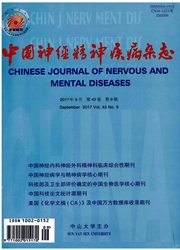

 中文摘要:
中文摘要:
目的探讨入院时胆红素水平与急性缺血性脑卒中患者出院复合结局(残疾或死亡)的关联。方法采用回顾性队列研究的方法,连续性纳入2009年6月1日至2012年5月31日阜新市中心医院神经内科3151例住院的急性缺血性脑卒中患者,收集人口统计学、生活方式、临床表现和实验室检验资料。出院时应用改良Rankin量表(modifiedRankinscale,mRS)评分,mRS≥3分为残疾,mRS≥3或死亡为复合结局。根据人院时总胆红素、间接胆红素、直接胆红素的四分位数水平分别将研究对象分为4组,采用Cox回归分析人院时胆红素水平与急性缺血性脑卒中患者出院残疾、死亡和复合结局的关联。结果发生残疾的病例为407例,残疾发生率为12.9%,死亡104例,病死率为3.3%。经多因素调整后,发现以总胆红素第1分位数组为参比,第4分位数组发生复合结局的aHR值(95%CI)为1.335(1.047~1.702);以间接胆红素第1分位数组为参比,第4分位数组发生复合结局的aHR值(95%CI)为1.355(1.062一1.728);以直接胆红素第1分位数组为参比,第3、4分位数组发生复合结局的aHR值(95%CI)分别为1.403(1.089~1.807)、1.431(1.118—1.833);并且随着总胆红素、间接胆红素和直接胆红素水平的升高,出院复合结局的发生风险也在增加(P〈0.05)。结论入院时胆红索水平的升高可增加急性缺血性脑卒中患者出院复合结局的风险、并且存在着剂量反应关系,是独立的危险因素。
 英文摘要:
英文摘要:
Objective To explore the attribution of serum bilirubin to the prognoss in patients with acute cerebral infarction. Methods In a non-concurrenr cohort study from June 1st 2009 to June 1st 2011, we continuously included 1351 patients with ischemic stroke. Serum albumin was measured at the time of admission. Functional outcome was mea- sured using the modified Rankin scale (mRS) at discharge. Disability and composite outcome was defined as mRS--〉3 and mRS--〉3 or death, respectively. Patients were then divided into four groups according to the quartile of serum biliru- bin. Multiple Cox regression analysis was used to assess the independent association between serum bilirubin and out- come. Results After adjusting for temperature, recurrence, hyperglycemia, fibrinogen and blood urea nitrogen. The risks of composite outcome with total bilirubin in the third quartile were higher than that in the first quartile, aHR and 95%CI were 1.335 (1.047 ± 1.702) respectively ; The risks of composite outcome with indirect bilirubin in the third quartile were higher than that in the first quartile, aHR and 95%CI were 1.355 (1.062 ± 1.728) respectively, The risks of composite outcome with bilirubin were higher in the third and the forth quartile than in the first quartile. AHR and 95%CI were 11.403 (1.08± 1.807) and 1.431(1.118 ± 1.833) respectively, There was do-response relationship between the serum bilirubin and risk of composite outcome. Condttslons The current study indicates that higher serum bilirubin is associat- ed with an increased rate of composite outcome in ischemie stroke patients.
 同期刊论文项目
同期刊论文项目
 同项目期刊论文
同项目期刊论文
 期刊信息
期刊信息
